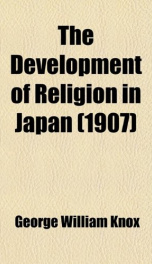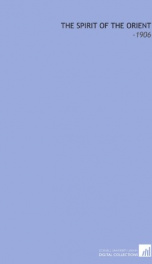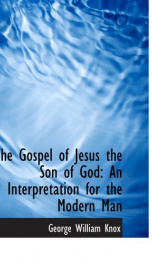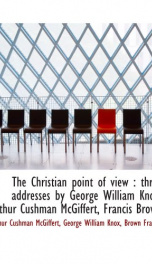the development of religion in japan

Purchase of this book includes free trial access to www.million-books.com where you can read more than a million books for free. This is an OCR edition with typos. Excerpt from book: LECTURE III. Buddhism, the Worship of the Absolute. Supernatural Eeligion. NO contrast in religion is greater than this, Shinto, the Way of the Gods, and Butsudo, the Way of the Buddhas. In Shinto all is simplicity: the shrine (mya) is the ancient hut slightly modified without elaboration or ornamentation; with the torii, or bird perch, before it,' it contains no idol or symbol except a mirror, and, in the great historic temples, the stored insignia; the priests are plain citizens who are versed in the ritual; the prayers are involved in form but simple in substance, and the divinities are the familiar objects of every-day contemplationmountains, and sea, and sun, and rock, and tree. Around these gather the sacred memories of the dead, and connected with them are the traditions of the past The worshipper is conscious of adoration, reverence, wonder, dependence, but he is unable to tell the inquirer how or why. There is neither creed nor dogma nor required cere- 1 The meaning of torii is still a topic of learned discussion. monial, but a dim conviction and a vague emotion which make life the better worth living.1 But when from the mya we pass to the tera, how great the contrast! Instead of the simple torii are towering gateways, elaborate, ornate, with immense guardian statues, and within are a large and complicated structure and elaborate worship : gongs, bells, incense, / revolving libraries, pagodas, sacred wells, drum towers, images, pictures, carvings, litanies, and companies of tonsured monks. There are monasteries, nunneries, schools for priests, assembly rooms for congregations, 'holy days and seasons; magnificently illuminated copies of sacred books with everything for the satisfaction of the intelligence, the emotions, and the will. Shinto has, prope...
Info about the book
Author:
Series:
Unknown
ASIN:
B008H4O4V2
Rating:
3.5/5 (1)Your rating:
0/5
Languge:
English
Users who have this book
Users who want this book
What readers are saying
What do you think? Write your own comment on this book!
write a commentif you like the development of religion in japan try:
Do you want to read a book that interests you? It’s EASY!
Create an account and send a request for reading to other users on the Webpage of the book!





